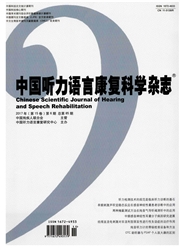

 中文摘要:
中文摘要:
目的:研究诺尔康人工耳蜗对耳鸣的治疗效果。方法对26例语后聋患者植入诺尔康人工耳蜗前后进行耳鸣问卷评估,评估材料采用耳鸣残疾评估量表(Tinnitus Handicap Inventory,THI)。结果21例(80.8%)患者自觉耳鸣消失或减弱,其中20例(76.9%)患者耳鸣治疗有效,THI得分与植入人工耳蜗前相比下降≥20分;3例患者自觉耳鸣无改善;1例患者自述耳鸣加重;1例患者术前无耳鸣,术后出现中度耳鸣。26例患者人工耳蜗植入术前THI总分平均分56.5±20.6,术后THI总分平均分20.2±20.9。经过配对t检验分析,配戴人工耳蜗前后的总分及功能性、情感性、严重性3个维度的得分具有显著差异(P=0.000〈0.05)。结论人工耳蜗植入对耳鸣有一定程度的改善作用,但仍存在一定风险。
 英文摘要:
英文摘要:
Objective To study the changes of tinnitus after Nurotron cochlear implantation and to evaluate the therapeutic evolution on tinnitus patients.Methods 26 Nurotron? Venus? cochlear implant recipients received the Tinnitus Handicap Inventory investigation before and after wearing the cochlear implant device.Results 20 patients (76.9%) got the THI score decreased more than 20 points after the implantation. Three patients had tinnitus intensity unchanged and one patient felt worsen. Furthermore, one patient without tinnitus had it occurred post-operation. The average THI score of pre-operation was 56.5±20.6, and post-operation score was 20.2±20.9. Statistical analysis showed a significant difference of the THI total and subscale scores (P=0.000〈0.05).Conclusion As an electrical stimulation treatment method, cochlear implant has the inhibitory effect on tinnitus. In order to avoid the bad risk, we need to do more in-depth research on it.
 同期刊论文项目
同期刊论文项目
 同项目期刊论文
同项目期刊论文
 期刊信息
期刊信息
